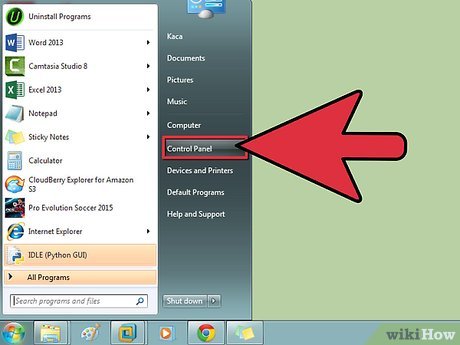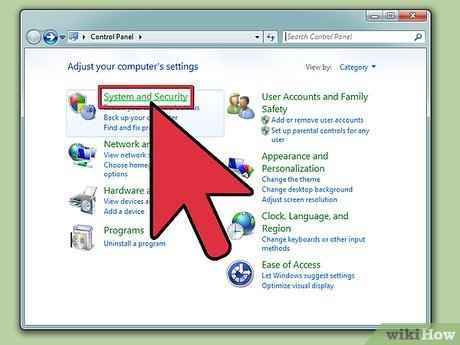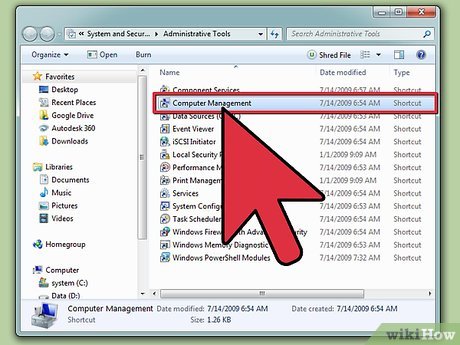How to Format an SSD Drive
Method 1 of 2:
Formatting an SSD Drive in Windows
-
 Verify that the SSD drive you want formatted is either installed in your computer, or attached to your computer via USB cable.
Verify that the SSD drive you want formatted is either installed in your computer, or attached to your computer via USB cable. -
 Go to 'Start' and click on 'Control Panel.'
Go to 'Start' and click on 'Control Panel.' -
 Click on 'System and Maintenance,' then click on 'Administrative tools.'
Click on 'System and Maintenance,' then click on 'Administrative tools.' -
 Open the 'Computer Management' application.
Open the 'Computer Management' application. -
 Click on 'Disk Management' in the left pane of the Computer Management window.
Click on 'Disk Management' in the left pane of the Computer Management window. -
 Click on the name of your SSD drive in the list of drives displayed on-screen.
Click on the name of your SSD drive in the list of drives displayed on-screen. -
 Right-click on the SSD drive, then select 'Format.'
Right-click on the SSD drive, then select 'Format.' -
 Select your preferred values from the 'File system' and 'Allocation unit size' drop-down menus.
Select your preferred values from the 'File system' and 'Allocation unit size' drop-down menus. -
 Place a checkmark next to 'Perform a quick format,' then click on 'OK.' Your computer will format your SSD drive.[1]
Place a checkmark next to 'Perform a quick format,' then click on 'OK.' Your computer will format your SSD drive.[1]
Method 2 of 2:
Formatting an SSD Drive on Mac OS X
-
 Verify that the SSD drive you want formatted is either installed in your computer, or attached to your computer via USB cable.
Verify that the SSD drive you want formatted is either installed in your computer, or attached to your computer via USB cable. -
 Open Finder to verify that the SSD drive displays in your list of devices.
Open Finder to verify that the SSD drive displays in your list of devices. -
 Click on 'Applications,' then click on 'Utilities.'
Click on 'Applications,' then click on 'Utilities.' -
 Launch the 'Disk Utility' application.
Launch the 'Disk Utility' application. -
 Click on the name of your SSD drive in the left pane of Disk Utility.
Click on the name of your SSD drive in the left pane of Disk Utility. -
 Click on the 'Erase' tab, then take note of the value next to 'Partition Map Scheme,' which is located at the bottom of the window.
Click on the 'Erase' tab, then take note of the value next to 'Partition Map Scheme,' which is located at the bottom of the window. -
 Verify that the value next to Partition Map Scheme reads, 'Master Boot Record' or 'Apple Partition Map,' then click on the 'Partition' tab.
Verify that the value next to Partition Map Scheme reads, 'Master Boot Record' or 'Apple Partition Map,' then click on the 'Partition' tab.- If the value next to Partition Map Scheme reads, 'GUID Partition Table,' select 'Mac OS X Extended (Journaled)' from the Format drop-down menu, click on 'Erase,' then skip to step #13.
-
 Select the number of partitions you want from within the 'Partition Layout' drop-down menu.
Select the number of partitions you want from within the 'Partition Layout' drop-down menu. -
 Type a name for the partition, or SSD drive, under 'Partition Information,' then select 'Mac OS Extended (Journaled) from the Format drop-down menu.
Type a name for the partition, or SSD drive, under 'Partition Information,' then select 'Mac OS Extended (Journaled) from the Format drop-down menu. -
 Click on the name of the SSD drive in the middle window, then click on 'Options.'
Click on the name of the SSD drive in the middle window, then click on 'Options.' -
 Select 'GUID Partition Table,' then click on 'OK.'
Select 'GUID Partition Table,' then click on 'OK.' -
 Click on 'Apply,' then click on 'Partition' to verify that you want to format your SSD drive.
Click on 'Apply,' then click on 'Partition' to verify that you want to format your SSD drive. -
 Wait for Disk Utility to format your SSD drive. The name of the drive will display in Finder when complete.[2]
Wait for Disk Utility to format your SSD drive. The name of the drive will display in Finder when complete.[2]
Share by
Kareem Winters
Update 24 March 2020





















